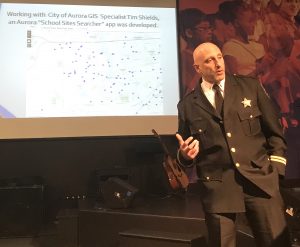Aurora, Naperville collaborate on planning to combat terrorism, other emergencies
By Jack McCarthy Chronicle Media — November 13, 2019
Aurora Police Lt. Jeff Wiencek talks about the city’s response to February’s Pratt Company shooting deaths and preparations for potential future incidents at last week’s update on how Aurora and Naperville are working together on responses mass shootings, terrorism or emergencies during a workshop at Naperville’s Calvary Church. The Pratt shootings “demonstrated that we are not immune from mass violence,” Wiencek said. (Photo by Jack McCarthy / Chronicle Media)
A workplace shooting in February that claimed the lives of five employees added Aurora to the unwelcome list of recent American tragedies.
The fatal shootings of six people — including the gunman — and injuries to five police officers inside the Henry Pratt Company drew a swift and overwhelming lawresponse by Aurora and regional law enforcement and emergency personnel.
Credit ongoing cooperation, planning and training between various local agencies.
Those ties are growing even stronger — particularly between the cities of Aurora and Naperville — thanks to a $1.4 million federal grant issued in 2017 to enhance and expand cooperation, preparation and best practices.
“We never really wanted to anticipate anything of such consequence that happened back in February of this year, but it did happen,” said Naperville Fire Chief Mark Puknaitis during a Nov. 7 community transparency workshop at Naperville’s Calvary Church. “We were prepared for that. We went to work and both communities did an outstanding job.”
Thursday’s gathering offered a progress report on the local Complex Coordinated Terrorist Attacks program plus a look ahead to a large scale exercise planned next year.
Workshop sponsors included the cities of Naperville and Aurora, Aurora Police, Aurora and Naperville fire departments and emergency management agencies from both communities.
The federal grant, awarded as part of a joint bid by Aurora and Naperville, was among three granted to Illinois entities as part of $35.9 million in national funding administered through the Federal Emergency Management Agency. Chicago’s Office of Emergency Management and Communications received nearly $700,000 while Illinois’ Emergency Management Agency was awarded $1.2 million.
“Attacks we have seen around the world have shown us the importance of continuing to build strong, resilient and prepared communities,” said then-FEMA Administrator Brock Long in a statement announcing the awards. “These grants will serve as a catalyst to support communities across the country to enhance resilience and continue to build capacity at the local level.”
Planning for worst-case scenarios in an area with a combined population of approximately 350,000 is complex and unending. Potential targets for violence include dozens of public and private schools, entertainment and sports venues, shopping malls and strips, and government buildings as well as businesses, hospitals and transportation sites.
According to a statement, Aurora and Naperville have used funds to “create new regional emergency plans, training and programs to prepare our cities for a potential worst-case scenario. The funding has also gone to help prepare citizens with … (training) programs at businesses, schools, churches and other locations across our two cities.”
Until this year, Aurora and Naperville had not experienced a workplace shooting or terrorism event like those that occurred elsewhere around the country, including an August tragedy that claimed 22 lives at a Walmart in El Paso, Texas.
But longstanding links between law enforcement, emergency personnel and community leaders paid off with a coordinated response in the Pratt shootings.
“Some four or five years ago when we started thinking about applying for this grant, we knew that it was going to be helpful for training, we knew it was going to great to help us put together plans, objectives, strategies that would allow us to be prepared even for the most horrifying incidents that could possibly happen,” Puknaitis said. “I can’t say enough about the collaboration that we’ve seen. It really set the stage for what’s going to happen in the future.”
Naperville planned a small-scale exercise this week to evaluate the city’s response to a potential active shooter event.
The big event comes between June 9-11, 2020 with a full-blown exercise lasting eight to 10 hours each day testing response and recovery scenarios.
“We are putting everything to the test,” said Natalie Wiza, Aurora’s emergency management specialist. “We’re being comprehensive and we’re collaborating. We’re trying to form those partnerships now, not when response happens.”



